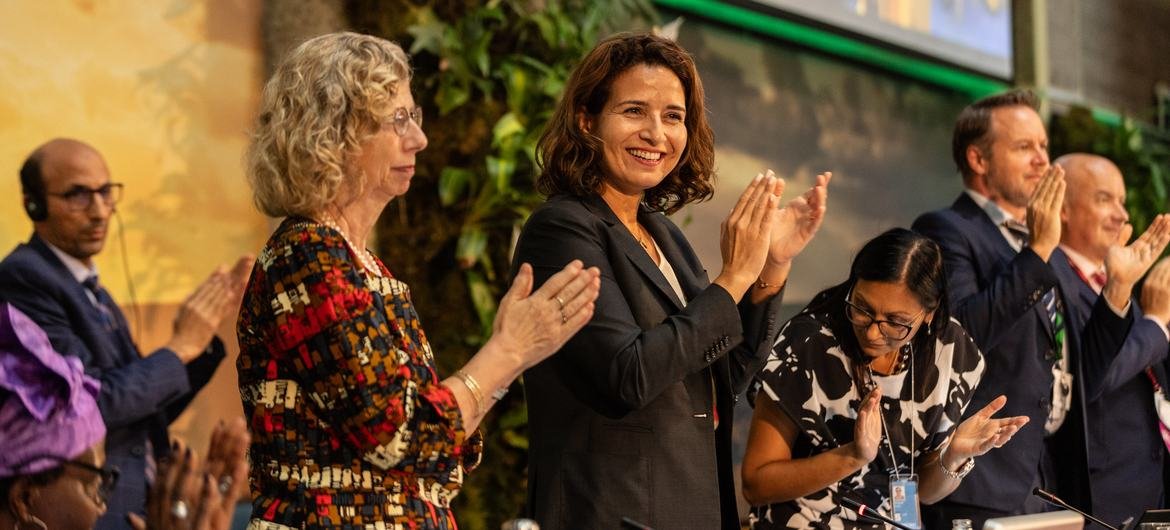Physical Address
304 North Cardinal St.
Dorchester Center, MA 02124
Physical Address
304 North Cardinal St.
Dorchester Center, MA 02124

With more than 7,000 delegates from 182 UN Member States and more than 170 ministers participating in Nairobi, UNEA-6 adopted a package of action plans, from promoting sustainable lifestyles to the sound management of chemicals and waste and sand and dust storms, issuing calls for immediate steps to rein in overconsumption and take smarter, greener steps towards sustainability.
“The world needs action, speed and real, lasting change”, said Inger Anderson, Executive Director of the UN Environment Programme (UNEP) at the closing session on Friday.
A ministerial declaration affirmed the international community’s strong intent to slow climate change, restore nature and land and create a pollution-free world, she said.
She added that true multilateralism was prevailing with wide engagement from civil society, indigenous peoples, international organisations, scientists and the private sector.
“UNEA-6 has delivered an extra boost to help us deliver this change and to ensure every person on this planet enjoys the right to a safe and healthy environment,” she said.
At a time when the world faces a triple planetary crisis of pollution, biodiversity loss and climate change, action must be swift and concerted, said UN Deputy Secretary-General Amina Mohammed.
She said the robust UNEA-6 discussions and outcome will accelerate the world’s common goals, including efforts to achieve both the African Union’s Agenda 2063 and the 2030 Agenda for Sustainable Development and its 17 Goals.
“We cannot afford to deplete nature’s resources without facing serious consequences,” the Deputy UN chief said in a video message. “The decisions we make today will shape our destiny tomorrow.”

UN News/Natalia Jidovanu
The virtual reality experience Vanishing Treasures aims to convey the impact of climate change on snow leopards, Bengal tigers and mountain gorillas.
Known as the “world parliament on the environment”, UNEA-6 became the highest decision-making body in the field at its inception in 2012. The goal is simple: to help restore the harmony between people and the nature. Read our explainer here.
During the five-day conference, UNEA-6 saw delegates debate everything from the use of artificial intelligence to solar engineering techniques.
Among the adopted resolutions, one provided guidance on how the world can do better on protecting the environment during and after conflicts, and another addressed how best to combat desertification.

UNEP/Natalia Mroz
Rappers Frida Amani and Dex McBean perform their track Get with the Programme/Twende na Mpangoon on Multilateral Environmental Agreements Day at UNEA-6.
Dozens of side events considered fresh initiatives and possible breakthroughs, including the use of artificial intelligence to fight climate change.
In the so-called fast fashion field, a UNEP and UN Alliance for Sustainable Fashion exhibit featured stylish clothing showcasing a project aimed at stopping overproduction and overconsumption, eliminating hazardous chemical byproducts and scaling circular business models which benefit the environment.
The UNEA-6 also hosted the first Multilateral Environmental Agreements Day, marked on 28 February.
Rich countries use six times more resources and generate 10 times the climate impacts than low-income nations, according to a UNEP report launched on Friday at UNEA-6.
The 2024 Global Resource Outlook contains a wide range of evidence-based findings and calls for sweeping policy changes to close the divide between rich and poor at all levels, while growing the economy, improving wellbeing and minimizing environmental impacts.
“The triple planetary crisis of climate change, nature loss and pollution is driven from a crisis of unsustainable consumption and production. We must work with nature, instead of merely exploiting it,” said UNEP chief Ms. Andersen ahead of the launch.
Indeed, the report showed that natural resource extraction is expected to rise by 60 per cent by 2060 and could derail efforts to achieve not only global climate, biodiversity, and pollution targets, but also economic prosperity and human wellbeing.
“Reducing the resource intensity of mobility, housing, food and energy systems is the only way we can achieve the Sustainable Development Goals (SDGs) and ultimately a just and liveable planet for all,” she said.
The outcome of UNEA-6 will feed into other like-minded collaborative global efforts towards sustainability, including the Summit of the Future, to be held at UN Headquarters in September.
The UN Framework Convention on Climate Change (UNFCCC) is the primary international, intergovernmental forum for negotiating the global response to climate change.